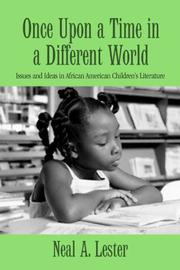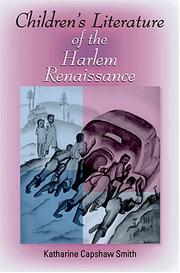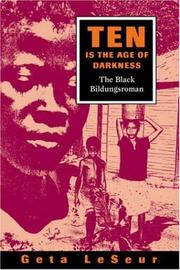| Listing 1 - 5 of 5 |
Sort by
|

ISBN: 1281122122 113586165X 1281394084 9786611394080 9786611122126 0203940768 9780203940761 0415980194 9780415980197 Year: 2007 Publisher: New York Routledge/Taylor & Francis Group
Abstract | Keywords | Export | Availability | Bookmark
 Loading...
Loading...Choose an application
- Reference Manager
- EndNote
- RefWorks (Direct export to RefWorks)
Once Upon a Time in a Different World, a unique addition to the celebrated Children's Literature and Culture series, seeks to move discussions and treatments of ideas in African America Children's literature from the margins to the forefront of literary discourse. Looking at a variety of topics, including the moralities of heterosexism, the veneration of literacy, and the ""politics of hair,"" Neal A. Lester provides a scholarly and accessible compilation of essays that will serve as an invaluable resource for parents, students, and educators. The much-needed reexamination of African American

ISBN: 1282071769 0253110920 9780253110923 0253344433 9780253344434 0253218888 9780253218889 Year: 2004 Publisher: Bloomington Indiana University Press
Abstract | Keywords | Export | Availability | Bookmark
 Loading...
Loading...Choose an application
- Reference Manager
- EndNote
- RefWorks (Direct export to RefWorks)
The Harlem Renaissance, the period associated with the flowering of the arts in Harlem, inaugurated a tradition of African American children's literature, for the movement's central writers made youth both their subject and audience. W.E.B. Du Bois, Carter G. Woodson, Langston Hughes, Alice Dunbar-Nelson, and other Harlem Renaissance figures took an impassioned interest in the literary models offered to children, believing that the "New Negro" would ultimately arise from black youth. As a result, African American children's literature became a crucial medium through which a disparate community forged bonds of cultural, economic, and aesthetic solidarity. Kate Capshaw Smith explores the period's vigorous exchange about the nature and identity of black childhood and uncovers the networks of African American philosophers, community activists, schoolteachers, and literary artists who worked together to transmit black history and culture to the next generation.
Harlem Renaissance. --- African Americans in literature. --- African American children in literature. --- African American children --- Children's literature, American --- American literature --- New Negro Movement --- Renaissance, Harlem --- African American arts --- Afro-Americans in literature --- Negroes in literature --- Afro-American children in literature --- Books and reading. --- History and criticism. --- African American authors --- Harlem (New York, N.Y.) --- Intellectual life
Book
ISBN: 9781609381783 1609381785 9781609381776 1609381777 Year: 2013 Publisher: University of Iowa Press
Abstract | Keywords | Export | Availability | Bookmark
 Loading...
Loading...Choose an application
- Reference Manager
- EndNote
- RefWorks (Direct export to RefWorks)
Long seen by writers as a vital political force of the nation, children's literature has been an important means not only of mythologizing a certain racialized past but also, because of its intended audience, of promoting a specific racialized future. Stories about slavery for children have served as primers for racial socialization. This first comprehensive study of slavery in children's literature, Slavery in American Children's Literature, 1790-2010, also historicizes the ways generations of authors have drawn upon antebellum literature in their own re-creations of slavery.
African American children in literature. --- African Americans in literature. --- Children's literature, American --- Children's literature, American. --- Ethnische Beziehungen. --- Kinderliteratur. --- LITERARY CRITICISM / Children's Literature. --- LITERARY CRITICISM --- Race relations in literature. --- Rassenpolitik. --- Schwarze. --- Sklaverei. --- Slavery in literature --- Slavery in literature. --- History and criticism. --- American --- General. --- Children's Literature. --- 1700-1999. --- USA.

ISBN: 0826261027 9780826261021 0826210112 9780826210111 Year: 1995 Publisher: Columbia University of Missouri Press
Abstract | Keywords | Export | Availability | Bookmark
 Loading...
Loading...Choose an application
- Reference Manager
- EndNote
- RefWorks (Direct export to RefWorks)
In Ten Is the Age of Darkness, Geta LeSeur explores how black authors of the United States and the English-speaking Caribbean have taken a European literary tradition and adapted it to fit their own needs for self-expression. LeSeur begins by defining the European genre of the bildungsroman, then shows how the circumstances of colonialism, oppression, race, class, and gender make the maturing experiences of selected young black protagonists different from those of their white counterparts. Examining the parallels and differences in attitudes toward childhood in the West Indies and the United States, as well as the writers' individual perspectives in each work, LeSeur reaches intriguing conclusions about family life, community participation in the nurturing of children, the timing and severity of the youngsters' confrontation of adult society, and the role played by race in the journey toward adulthood. LeSeur's readings of African American novels provide new insights into the work of Langston Hughes, James Baldwin, Toni Morrison, Paule Marshall, and Richard Wright, among others. When read as examples of the bildungsroman rather than simply as chronicles of black experiences, these works reveal an even deeper significance and have a more powerful impact.
American fiction --- West Indian fiction (English) --- African American children in literature. --- African American youth in literature. --- Children, Black, in literature. --- African Americans in literature. --- Youth, Black, in literature. --- Blacks in literature. --- Bildungsromans. --- Psychological fiction, American --- Bildungsromans, American --- African Americans --- Maturation (Psychology) in literature. --- Blacks in literature --- African American children in literature --- Maturation (Psychology) in literature --- African Americans in literature --- Children, Black, in literature --- American Literature --- English --- Languages & Literatures --- Afro-Americans in literature --- Negroes in literature --- Afro-Americans --- Black Americans --- Colored people (United States) --- Negroes --- Africans --- Ethnology --- Blacks --- Afro-American children in literature --- English fiction --- West Indian literature (English) --- African American intellectuals --- Apprenticeship novels --- Bildungsroman --- Bildungsromane --- Coming of age --- Coming-of-age novels --- Entwicklungsromane --- Erziehungsromane --- Fiction --- African American authors --- History and criticism. --- Black authors --- Intellectual life. --- History and criticism --- Intellectual life --- West Indian authors --- West Indies --- In literature. --- Black people --- Black people in literature. --- African Americans. --- Black authors.

ISBN: 0826210112 Year: 1995 Publisher: Columbia, MO : University of Missouri Press,
Abstract | Keywords | Export | Availability | Bookmark
 Loading...
Loading...Choose an application
- Reference Manager
- EndNote
- RefWorks (Direct export to RefWorks)
In Ten Is the Age of Darkness, Geta LeSeur explores how black authors of the United States and the English-speaking Caribbean have taken a European literary tradition and adapted it to fit their own needs for self-expression. LeSeur begins by defining the European genre of the bildungsroman, then shows how the circumstances of colonialism, oppression, race, class, and gender make the maturing experiences of selected young black protagonists different from those of their white counterparts. Examining the parallels and differences in attitudes toward childhood in the West Indies and the United States, as well as the writers' individual perspectives in each work, LeSeur reaches intriguing conclusions about family life, community participation in the nurturing of children, the timing and severity of the youngsters' confrontation of adult society, and the role played by race in the journey toward adulthood. LeSeur's readings of African American novels provide new insights into the work of Langston Hughes, James Baldwin, Toni Morrison, Paule Marshall, and Richard Wright, among others. When read as examples of the bildungsroman rather than simply as chronicles of black experiences, these works reveal an even deeper significance and have a more powerful impact.
African American children in literature. --- African Americans in literature. --- African Americans --- American fiction --- Bildungsromans, American --- Blacks in literature. --- Children, Black, in literature. --- Maturation (Psychology) in literature. --- Psychological fiction, American --- West Indian fiction (English) --- Intellectual life. --- African American authors --- History and criticism. --- Black authors --- LITTERATURE AFRO-AMERICAINE --- Littérature antillaise de langue anglaise --- ROMAN AMERICAIN --- ROMAN ANTILLAIS DE LANGUE ANGLAISE --- ROMAN PSYCHOLOGIQUE AMERICAIN --- ROMAN D'EDUCATION --- ENFANTS NOIRS AMERICAINS DANS LA LITTERATURE --- NOIRS AMERICAINS --- MATURATION (PSYCHOLOGIE) DANS LA LITTERATURE --- NOIRS AMERICAINS DANS LA LITTERATURE --- ENFANTS NOIRS DANS LA LITTERATURE --- NOIRS DANS LA LITTERATURE --- REGION CARAÏBE --- HISTOIRE ET CRITIQUE --- Histoire et critique --- AUTEURS NOIRS --- VIE INTELLECTUELLE --- DANS LA LITTERATURE
| Listing 1 - 5 of 5 |
Sort by
|

 Search
Search Feedback
Feedback About UniCat
About UniCat  Help
Help News
News